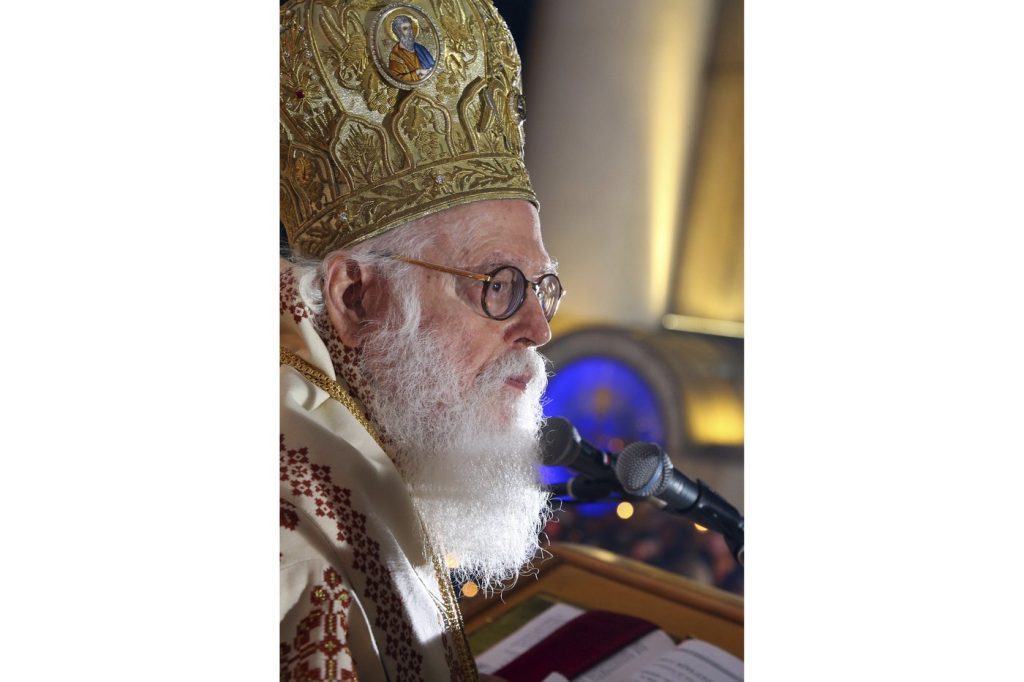TIRANA, Albania (AP) — Archbishop Anastasios, the spiritual leader who revitalized Albania's Orthodox Church after the fall of the communist regime in 1990, has passed away at the age of 95. His death was confirmed by the church on Saturday, following a period of hospitalization due to serious health complications.
Anastasios, who held the title of Archbishop of Tirana, Durres, and All Albania, died in the intensive care unit at Evangelismos hospital in Athens. According to church officials, he succumbed to "polyorgan deficiency" after being initially hospitalized in Tirana with a viral infection on December 30. His condition worsened, prompting a transfer to Athens, where he underwent surgery on January 10 for gastrointestinal bleeding. Since then, his condition was reported as critical.
The Orthodox Church released a statement highlighting Archbishop Anastasios’s monumental role as the "rebuilder and revitalizer" of the Albanian Orthodox Church, which had faced severe restrictions and oppression during the atheistic communist regime. The church noted that he had rebuilt church life from the ground up, constructing hundreds of churches and establishing educational and charitable institutions. Anastasios served the faithful unceasingly for over 33 years, nurturing a new generation of clergy.
In response to the news, Albanian President Bajram Begaj expressed that the nation had lost its "spiritual leader and a distinguished personality," emphasizing that Anastasios's legacy would live on in the hearts of those who honored him. Greek Prime Minister Kyriakos Mitsotakis commented on Anastasios's "invaluable" contribution to Orthodox Christianity, stating that he left an indelible mark not only in Albania but beyond.
Born Anastasios Yannoulatos in 1929 in Piraeus, Greece, he arrived in Albania in 1991 shortly after the collapse of the communist regime that had prohibited religious practices since the mid-1940s. Prior to his arrival, the regime had confiscated properties associated with all established religions, including Islam, Orthodoxy, and Catholicism. According to the 2023 census, Orthodox believers constitute approximately 7% of Albania's 2.4 million population, although the church asserts that the actual figure is higher. The country is predominantly Muslim, followed by Catholics and Orthodox Christians, all coexisting peacefully.
After the communist regime’s downfall in December 1990, believers found themselves without adequate places of worship, as many mosques and churches had been seized. The process of property restitution is ongoing, with various religious communities still claiming properties and buildings. Under Anastasios’s leadership, the Orthodox Church in Albania significantly flourished after its legalization. He was elected as its head in 1992 and continuously advocated for interfaith dialogue, health care support, education, and social development initiatives across the nation.
In the years following the regime's fall, more than 400 parishes were reorganized, 150 new churches were built, and numerous churches, monasteries, and cultural monuments were restored or reconstructed. Anastasios was pivotal in educating and ordaining 168 clergy and establishing youth centers throughout the country. Furthermore, he oversaw the translation and publication of liturgical and religious texts into Albanian.
Notably, the church undertook the construction of three hydropower projects, which are intended to financially support its spiritual, philanthropic, and educational pursuits. Anastasios, who was born on November 4, 1929, received his Bachelor of Divinity and Doctor of Theology from the University of Athens. He also studied in Germany at the universities of Hamburg and Marburg.
Beyond his ecclesiastical duties, Archbishop Anastasios was recognized for his academic contributions, having served as a professor and dean at the University of Athens. His leadership extended to international religious organizations, including the World Council of Churches. Anastasios was a prolific author, writing 24 books on subjects related to religious research, missionary work, and Orthodox spirituality, along with over 200 studies and articles that have been translated into 17 languages.










